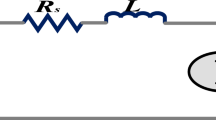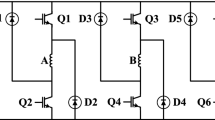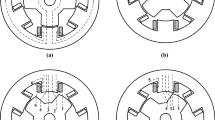Abstract
At present, switched reluctance motors (SRM) become very interesting for many industrial applications in variable speed control. For such systems, the linear quadratic regulator with integral action (LQI) method is commonly used when using plants in state spaces due to its robustness and easy adjustment. All methods from the linear quadratic regulator (LQR) project provide a weighting of the Q and R matrices, which are manually adjusted to achieve the desired performance. The manual fine tuning of LQI controller parameters is a difficult task that requires a high level of domain knowledge. In this work, metaheuristic algorithms are explored to design the LQI controller and a comprehensive comparison is made between these algorithms and Proportional-Integral-Derivative (PID) controller as well as to select the best technique for the LQI controller design and adjustment of the Q and R parameters in SR Motor. Simulation and experimental results on a setup prototype are shown to validate the proposed control schemes. This paper has as main contributions the weighting of the parameters of the LQI in an optimized way and adjustment of the gains of the controller more quickly and the hybrid controller (LQI + GA) becomes more powerful in the sense of a possible extension of the control of a multivariable system.
Similar content being viewed by others
References
C. C. Chan, “The state of the art of electric and hybrid vehicles,” Proceedings of the IEEE, vol. 90, no. 2, pp. 247–275, 2002.
M. Krishnamurthy, C. S. Edrington, A. Emadi, P. Asadi, M. Ehsani, and B. Fahimi, “Making the case for applications of switched reluctance motor technology in automotive products,” IEEE Transactions on Power Electronics, vol. 21, no. 3, pp. 659–675, 2006.
N. F. Maged, “Variable angle adjustable-high speed control with PI for SRM,” Proc. of World Automation Congress, IEEE, 2010.
W. A. Silva, L. L. N. dos Reis, B. C. Torrico, and R. N. de C. Almeida, “Speed control in switched reluctance motor based on generalized predictive control,” Proc. of Brazilian Power Electronics Conference, IEEE, 2013.
H. Hala, M. Hilairet, and C. Marchand, “Design of an SRM speed control strategy for a wide range of operating speeds,” IEEE Transactions on Industrial Electronics, vol. 57, no. 9, pp. 2911–2921, 2010.
B. C. Torrico, R. N. de C. Almeida, L. L. N. dos Reis, W. A. Silva, and R. S. T. Pontes, “Robust control based on generalized predictive control applied to switched reluctance motor current loop,” Journal of Dynamic Systems, Measurement, and Control, vol. 136, no. 3, 031021, 2014.
W. B. Correia, R. C. Almeida, W. A. da Silva, B. C. Torrico, V. P. Pinto, and L. L. N. dos Reis, “The T-polynomial approach for LQG control applied to a switched reluctance motor (SRM),” Przeglad Elektro-techniczny, 2016. DOI: https://doi.org/10.15199/48.2016.02.44
T. Hidefumi and M. Araki, “Two-degree-of-freedom PID controllers—their functions and optimal tuning,” IFAC Proceedings Volumes, vol. 33, no. 4, pp. 91–96, 2000.
M. Araki and T. Hidefumi, “Two-degree-of-freedom PID controllers,” International Journal of Control, Automation, and Systems, vol. 1, no. 4, 2003.
E. Okyere, A. Bousbanie, G. T. Poyi, A. K. Joseph, and J. M. Andrade, “LQR controller design for quad-rotor helicopters,” The Journal of Engineering, vol. 2019, no. 17, pp. 4003–4007, 2019.
C. Han and W. Wang, “Distributed observer-based LQ controller design and stabilization for discrete-time multiagent systems,” International Journal of Control, Automation and Systems, vol. 16, no. 4, pp. 1765–1774, 2018.
Z. Feng, J. Zhu, and R. Allen, “Design of LQI control systems with stable inner loops,” Journal of Shanghai Jiaotong University (Science), vol. E, 2007.
X. Wang, X. Chen, and L. Wen, “The LQR baseline with adaptive augmentation rejection of unmatched input disturbance,” International Journal of Control, Automation and Systems, vol. 15, no. 3, pp. 1302–1313, 2017.
Z. Cui and X. Gao, “Theory and applications of swarm intelligence,” Neural Computing and Applications, vol. 21, no. 2, pp. 205–206, 2012.
R. G. Kanojiya and P. M. Meshram, “Optimal tuning of PI controller for speed control of DC motor drive using particle swarm optimization,” Proc. of International Conference on Advances in Power Conversion and Energy Technologies (APCET), 2012.
S. Kazarlis, A. Bakirtzis, and V. Petridis, “A genetic algorithm solution to the unit commitment problem,” IEEE Transactions on Power Systems, vol. 11, no. 1, pp. 83–92, 1996.
L. Li, W. Liu, and D. A. Cartes, “Particle swarm optimization-based parameter identification applied to permanent magnet synchronous motors,” Engineering Applications of Artificial Intelligence, vol. 21, no. 7, pp. 1092–1100, 2008.
G. Sushnigdha and A. Joshi, “Evolutionary method based integrated guidance strategy for reentry vehicles,” Engineering Applications of Artificial Intelligence, vol. 69, pp. 168–177, 2018.
J. Yao, G. Yang, Z. Jiao, and D. Ma, “Adaptive robust motion control of direct-drive DC motors with continuous friction compensation,” Abstract and Applied Analysis, vol. 2013, Article ID 837548, 2013.
T. J. E. Miller, Electronic Control of Switched Reluctance Machines, Elsevier, 2001.
K. Ramu, Switched Reluctance Motor Drives: Modeling, Simulation, Analysis, Design, and Applications, CRC press, 2017.
I. Boussaïd, J. Lepagnot, and P. A. Siarry, “Survey on optimization metaheuristics,” Information Sciences, vol. 237, pp. 82–117, 2013.
J. M. Kanieski, Modelagem e Controle LQR Aplicado a um Condicionador de Energia, Dissertação de Mestrado, Universidade Tecnológica Federal do Paraná, Pato Branco, PR, 2010.
A. Mituhiko and H. Taguchi, “Two-degree-of-freedom PID controllers,” International Journal of Control, Automation, and Systems, vol. 1, no. 4, pp. 401–411, 2003.
R. Gorez, “New design relations for 2-DOF PID-like control systems,” Automatica, vol. 39, no. 5, pp. 901–908, 2003.
A. Owczarkowski, D. Horla, and J. Zietkiewicz, “Introduction of feedback linearization to robust LQR and LQI control-analysis of results from an unmanned bicycle robot with reaction wheel,” Asian Journal of Control, vol. 21, no. 2, pp. 1028–1040, 2019.
A. Owczarkowski and D. Horla, “Robust LQR and LQI control with actuator failure of a 2DOF unmanned bicycle robot stabilized by an inertial wheel,” International Journal of Applied Mathematics and Computer Science, vol. 26, no. 2, pp. 325–334, 2016.
Author information
Authors and Affiliations
Corresponding author
Additional information
Publisher’s Note Springer Nature remains neutral with regard to jurisdictional claims in published maps and institutional affiliations.
Recommended by Editor Young IL Lee. The authors thank to CAPES for the financial support to this work.
Darielson A. Souza is currently studying for a doctorate in Electrical Engineering at Federal University of Ceará — Fortaleza-CE. His main research areas are computational intelligence (RNAs, fuzzy systems, metaheuristics, hybrid systems and committee) with applications in dynamic systems identification, robotics, classification problems, regression and time series modeling/forecasting.
Vinicius A. de Mesquita is currently a master’s student at Federal University of Ceará. Graduated in Electrical Engineering from Federal University of Ceará (2017), with emphasis on Electrical Machines, Control Systems and Industrial Automation.
Laurinda L. N. Reis holds a degree in Electrical Engineering from Federal University of Ceará (1979), a master’s degree in Electrical Engineering from Federal University of Paraíba (1984) and a doctorate from Federal University of Santa Catarina in 2008. Her research areas of interest are electric machines drive, controllers PID, adaptive and predictive control, advanced control techniques and nonlinear control.
Wellington A. Silva holds a degree in electrical engineering from Federal University of Ceará (2011), a master’s degree in electrical engineering from Federal University of Ceará (2013) and a doctorate in electrical engineering from Federal University of Ceará (2017). He has experience in electrical engineering, focusing on machine drive, industrial electronics, systems and electronic controls.
Josias G. Batista is currently studying for a doctorate in Electrical Engineering at Federal University of Ceará. His main research areas are electrical/mechanical, focusing on industrial maintenance, industrial automation, industrial robotics, mobile robotics, instrumentation and process control, electrical machines and drives.
Rights and permissions
About this article
Cite this article
Souza, D.A., de Mesquita, V.A., Reis, L.L.N. et al. Optimal LQI and PID Synthesis for Speed Control of Switched Reluctance Motor Using Metaheuristic Techniques. Int. J. Control Autom. Syst. 19, 221–229 (2021). https://doi.org/10.1007/s12555-019-0911-x
Received:
Revised:
Accepted:
Published:
Issue Date:
DOI: https://doi.org/10.1007/s12555-019-0911-x




